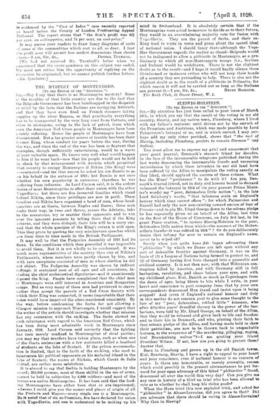THE MYSTERY OF MONTENEGRO.
[TO THE EDITOR OF THE " SPECTATOR."J
SIR,—May I say that there is no Montenegrin mystery? Some of the troubles of that little country are due to the fact that the Belgrade Government has been handicapped in the despatch
of relief by the facts that the Italians are occupying Andvari, and that they have even fired on French steamers taking supplies up the river Boyana, so that practically everything
/as to be transported by the very long road from Cattaro, and
often in ox-wagons, owing to the lack of petrol, from which even the American Red Cross people in Montenegro have been acutely suffering. Hence the people of Montenegro have been discontented. But a far greater source of trouble has been their former King, whose conduct for years before the war, during the war, and since the end of the war has been so flagrant that examples, though sufficiently entertaining, would be a waste of your valuable space. Ile knows very well what would happen to him if he went back—now that his people would not be held in check by that arrangement with Austria which permitted that country to occupy Montenegro if Nikita [the King] were
as3assinated—and for that reason he asked his son Danilo to go on his behalf in the autumn of 1918; but Danilo is not sure
whether his own popularity is extensive; therefore he was suffering from influenza. As Lord Curzon said, it is the ardent desire of most Montenegrins to effect their union with the other Yugo-Slays; but there are five favoured families which stand behind Nikita, since their privileges are now in peril. Those families and Nikita have organized a band of men, whose head- quarters are at Gaeta, between Naples and Rome; these men make their way, in twos and threes, across the Adriatic, take to the mountains, try to murder their opponents and to win over the ignorant peasants by telling them that if the King returns, and they were disloyal, their fate will be a sorry one. and that the whole question of the King's return is still open. This they prove by quoting the very mischievous speeches which are from time to time made in the British Parliament.
It may well be that the Podgorica Assembly of 1918 had its flaws. In the conditions which then prevailed it was impassible to avoid them. But it is not wholly to be condemned. It was much more representative of the country than any of Nikita's Parliaments, whose members were partly chosen by him, and with rare exceptions consisted of men to whose election he did not object. The Podgorica Assembly was chosen by indirect suffrage, it contained men of all ages and all avocations, in- cluding the chief ecclesiastical dignitaries—and it unanimously deposed the Ring. People have complained that the chief men of Montenegro were still interned in Austrian and Hungarian camps. But as very many of these men had preferred to starve rather than accept the parcels of a Red Cross Society with which their King was connected, it seems improbable that their votes would have impaired the afore-mentioned unanimity. By the way, before condemning the Serbs for not allowing a Glasgow mission to approach Montenegro, I would suggest that the writer of the article should investigate whether that mission has any -connexion with the ex-King. The Serbs showed no such reluctance with regard to the American Red Cross, which has been doing most admirable work in Montenegro since January, 1919. Lord Curzon said correctly that the fighting has been merely confined to Montenegrins of rival parties; you may say that murders have taken place, such as when one of the Gaeta emissaries with a few assistants killed a boatload of students on the lake of Scutari. If the prison accommoda- tion la limited, that is the fault of the ex-King, who used to incarcerate his political opponents on his malarial island in the lake of Scutari; the rooms at Nicksic, which Count de Salle visited, are rather more salubrious.
It is absurd to say that Serbia is holding Montenegro by the sword; 350,000 persons, most of them skilful in the use of arms, cannot be held in subjection by 6,000 soldiers—and most of the troops are native Montenegrins. It has been said that the lead- ing Montenegrins have either been shot or are imprisoned; whereas I could give you the names and places of origin of all the Prefects and Masers—every single one is a Montenegrin. Be It noted that of aix ex-Premiers, five have declared for union with Yugo-Slavin. and one is understood to be making up his mind in Switzerland. It is absolutely certain that if the Montenegrins were asked to-morrow to decide as to their future, they would in an overwhelming majority vote for fusion with Yugo-Slavia. They are the purest of Serbs, and their ex- King used to write in verse and prose about the sacred ideal of national union. I should fancy that—although the Yugo- Slav Government regards the matter as closed—Belgrade would not be indisposed to allow a plebiscite in Montenegro, as a pre- liminary to which all non-Montenegrin troops (i.e., Serbian and Italian) would be withdrawn. There is not the slightest doubt, as to the result—and I hope it would finally silence those ill-informed or insincere critics who will not keep their hands off a country they are pretending to help. There is also not the slightest doubt as to the result of a plebiscite in Dalmatia, for which reason it will not be carried out so long as the Italians can prevent it. —I am, Sir, &c., HENRY BAERLEIN. The Bath Club, 34 Dover Street, W. 1.


































 Previous page
Previous page